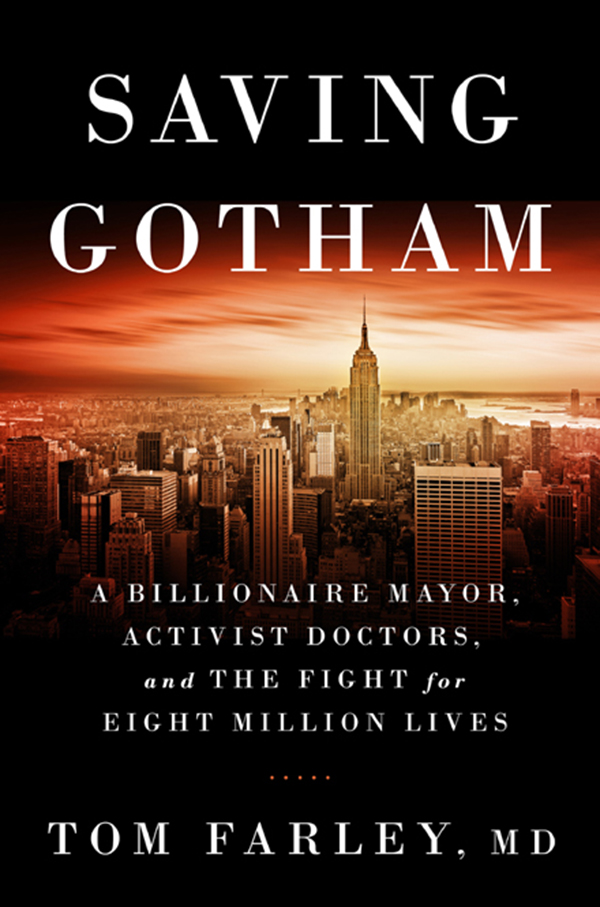
Saving Gotham
A Billionaire Mayor, Activist Doctors, and the Fight for Eight Million Lives
شهردار بیلیونر، پزشکان فعال، و مبارزه برای هشت میلیون لیره
کتاب های مرتبط
- اطلاعات
- نقد و بررسی
- دیدگاه کاربران
نقد و بررسی

Starred review from August 24, 2015
Farley, commissioner of the New York City Department of Health and Mental Hygiene from 2009 to 2014, revisits the controversial public health initiatives introduced during his tenure and that of his predecessor, Tom Frieden (in office from 2002 to 2009), under then-mayor Michael Bloomberg. Their mission was “to save lives millions at a time,” but it was the method that was revolutionary: shifting focus from preventing communicable diseases to noncommunicable ones, including heart disease, stroke, cancer, diabetes, and chronic lung disease. To wage this monumental battle, Bloomberg and his health department took on the tobacco and food industries by levying a cigarette tax, banning trans fats from restaurants and requiring calorie labels on menus, carving out smoke-free public areas, and helping cut salt in foods. There were losses, too—most famously Bloomberg’s soda tax—as well as a skeptical media that chided the administration as an intrusive nanny state. Nevertheless, between 2001 and 2010, life expectancy in New York City increased by three years, compared with 1.8 years nationwide; and the number of New Yorkers who died of heart disease caused by smoking, diet, and physical inactivity in 2012 was down by more than 8,000 compared to 2000. Farley acknowledges that these kinds of public initiatives may cause some individual discomfort, but contends that there’s little doubt that they save lives.

August 15, 2015
A New York City-based saga showing how "saving lives in America today means fighting to protect people from the pervasive marketing of cigarettes, junk food, and other unhealthy products." The city's bold public health initiatives during the Michael Bloomberg administration were an unmitigated success, but his policies met with plenty of controversy and contention before becoming worldwide models. In the United States, nearly 4 in 10 people die from chronic diseases like heart disease, cancer, and diabetes. During his terms as mayor, Bloomberg-advised by his forward-thinking Health and Mental Hygiene commissioners, Thomas Frieden and Farley (co-author: Prescription for a Healthy Nation: A New Approach to Improving Our Lives by Fixing Our Everyday World, 2005)-committed to battling this preventable epidemic by revolutionizing public health policy. They led a visionary team of doctors and public health experts in passing breakthrough laws that made healthy behaviors easier: they outlawed smoking in bars and banned cooking with trans fats; they required fast-food restaurants to post calorie counts for their menu items, and they barred them from selling outsized sugary drinks. The author, who succeeded Frieden, provides an enthralling insider's view of the high-stakes battle between the administration and the powerful corporations who have made billions selling toxic foods, sodas, and cigarettes. It's not giving anything away to say that the good guys won. As a result, hundreds of thousands of New Yorkers quit smoking, childhood obesity rates slumped, and between 2001 and 2010, life expectancy rose by three years, almost double the nationwide average. In his informed and inspired retelling, Farley provides plenty of behind-the-scenes access to the negotiations, compromises, and brilliant strategies that shaped this now-historic era. An inspiring story in which the author demonstrates unequivocally that public health policy can not only save lives; it can change the way we view the landscape of food.
COPYRIGHT(2015) Kirkus Reviews, ALL RIGHTS RESERVED.

October 1, 2015
Imagine trying to save eight million people from themselves. Well, from making some bad choices, anyway. That was the task author and current New York City Department of Health and Mental Hygiene commissioner Farley stepped up to undertake when he signed on to help former mayor Michael Bloomberg clear the city's air of cigarette smoke. Even though Bloomberg had thrown down the gauntlet, the real driver was Farley's predecessor, Thomas Frieden. According to Farley, when Frieden took the department's reins, in 2001, it was accomplishing little more than issuing birth and death certificates. The latter showed that most were dying of what Farley calls noncommunicable diseasescancer, heart disease, diabetes, and stroke. Frieden's vision included rewriting the definition of public health to include combating diseases brought on by poor life choices such as smoking and consuming unhealthy trans fats and sugary foods. Although this reads somewhat like an apologia in an effort to offset massive media criticism and food-industry lawsuits, Farley does offer plausible justification for widening the boundaries of public health's reach.(Reprinted with permission of Booklist, copyright 2015, American Library Association.)

























دیدگاه کاربران